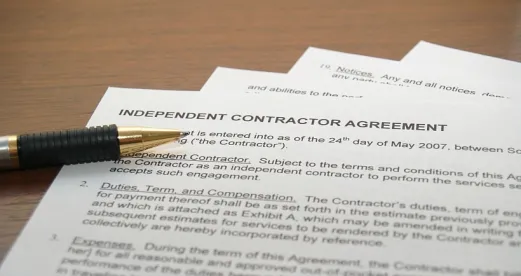On January 29, 2019, the Third Circuit Court of Appeals concluded that the Federal Aviation Administration Authorization Act of 1994 (FAAAA) does not preempt New Jersey’s ABC test for determining whether a worker is an independent contractor or employee. The case is Bedoya v. American Eagle Express Inc.
Background
Congress enacted the FAAAA in 1994 to preempt state trucking regulations that had become burdens on interstate commerce and free trade, and to avoid a “patchwork” of state laws, rules, and regulations that increased costs and caused significant inefficiencies for interstate motor carriers. To promote this goal, the FAAAA included an express preemption provision, providing that states cannot enact or enforce laws or regulations “related to a price, route, or service of any motor carrier . . . with respect to the transportation of property.”
The plaintiffs in Bedoya worked as drivers for defendant American Eagle Express, Inc. (AEX), a logistics company that provides delivery services to medical organizations. The plaintiffs thereafter filed a putative class action against AEX, arguing that they were misclassified as independent contractors rather than employees and pursuing claims under the New Jersey Wage and Hour Law and New Jersey Wage Payment Law. Under those state laws, a worker is considered an employee unless the hiring entity can demonstrate each prong of the New Jersey ABC test established in 2015:
-
Such individual has been and will continue to be free from control or direction over the performance of such service, both under his contract of service and in fact; and
-
Such service is either outside the usual course of the business for which such service is performed or that such service is performed outside of all the places of business of the enterprise for which such service is performed; and
-
Such individual is customarily engaged in an independently established trade, occupation, profession or business.
In response to the plaintiffs’ lawsuit, AEX filed a motion for judgment on the pleadings, advancing a single, potentially case-dispositive argument: that the plaintiffs’ complaint was preempted by the FAAAA. The motion was denied by the district court, and the appeal ensued.
The Third Circuit’s Summary of the Preemption Standard
Tasked with determining whether New Jersey’s ABC test was preempted by the FAAAA, the Third Circuit began by reviewing previous preemption cases. Based on that case law, the Bedoya court concluded there are two relevant questions. First, does the challenged law have a “direct impact on carriers’ prices, routes, or services”? If so, the Third Circuit reasoned that the challenged law would be preempted, unless it fell within one of the specified statutory exceptions. Second, is there a “significant effect on a carrier’s prices, routes, or services”? If so, the challenged law would be preempted, even if the impact was indirect.
The Third Circuit then laid out the analyses to be applied in determining whether a state statute has a “direct” and/or “significant” impact on prices, routes, and services:
In sum, to assess the directness of a law’s effect on prices, routes, or services, courts should examine whether the law: (1) mentions a carrier’s prices, routes, or services; (2) specifically targets carriers as opposed to all businesses; and (3) addresses the carrier-customer relationship rather than non-customer-carrier relationships (e.g., carrier-employee).
* * *
To assess whether a law has a significant effect on a carrier’s prices, routes, or services, courts should consider whether: (1) the law binds a carrier to provide or not provide a particular price, route, or service; (2) the carrier has various avenues to comply with the law; (3) the law creates a patchwork of regulation that erects barriers to entry, imposes tariffs, or restricts the goods a carrier is permitted to transport; and (4) the law existed in one of the jurisdictions Congress determined lacked laws that regulate intrastate prices, routes, or services and thus, by implication, is a law Congress found not to interfere with the FAAAA’s deregulatory goal. Other factors may also lead a court to decide that a state law has a significant effect where the law undermines Congress’ goal of having competitive market forces dictate prices, routes, or services of motor carriers. [Emphasis added.]
Application of These Standards to New Jersey’s ABC Test
Turning to the matter at hand, the Third Circuit “examined each of these considerations and conclude[d] that New Jersey’s ABC classification test is not preempted as it has neither a direct, nor an indirect, nor a significant effect on carrier prices, routes, or services.”
In finding the New Jersey test had no “direct” impact on prices, routes, or services, the Third Circuit observed that the ABC test makes no mention of carrier prices, routes, or services. Nor does the test single out carriers; it applies to all New Jersey businesses. Moreover, the Third Circuit noted that the test does not regulate carrier-customer interactions or other “production outputs,” addressing instead only employer-worker relationships. As a result, the Bedoya court found “the test is ‘steps removed’ from regulating customer-carrier interactions through prices, routes, or services.”
The Third Circuit also concluded that the New Jersey test did not have a “significant” impact on carrier prices, routes, or services. In reaching this conclusion, the Bedoyacourt noted that the test did not bind AEX to a particular method of providing services. On this point, the Third Circuit was careful to distinguish the New Jersey test from the Massachusetts version of the ABC test, which the First Circuit previously held was preempted by the FAAAA. Unlike the more stringent Massachusetts test, which “bound the carrier to provide its services using employees” because it “essentially foreclosed the independent contractor classification of any of the carrier’s workers,” the Third Circuit concluded that the New Jersey test does not “categorically prevent[] carriers from using independent contractors.” The Bedoya court then proceeded to analyze the other pertinent factors it had identified, concluding they did not support preemption under the FAAAA.
Key Takeaways
Through the Bedoya decision, the Third Circuit has announced the criteria that it will use to analyze FAAAA preemption arguments. Ultimately, applying those criteria to the case before it, the Third Circuit held there was insufficient evidence that New Jersey’s ABC test had a “direct” or “significant” impact on AEX’s prices, routes, and services, as would be necessary to trigger preemption. However, given the preliminary stage of the proceedings, the Third Circuit was limited to considering the parties’ pleadings and viewing them in a light most favorable to the drivers. Thus, it remains to be seen whether similar arguments would be more successful if supported by evidence demonstrating that a statute has a direct and/or significant impact on prices, routes, and services.
The Bedoya court also acknowledged that other tests for determining independent contractor status, such as the Massachusetts ABC test, could be preempted by the FAAAA. Indeed, the Third Circuit agreed with the First Circuit that the FAAAA may preempt state rules that essentially foreclose the use of independent contractors. Accordingly, businesses can argue that the Bedoya decision is limited to the specific statute that was before the court, as well as the narrow evidence available to the Third Circuit on a motion at the pleadings stage of the case.
Because the issue was not raised, the Bedoya court did not decide whether the FAAAA preempts the New Jersey Wage and Hour Law or New Jersey Wage Payment Law, the statutes pursuant to which the plaintiffs’ claims were actually brought. While the criteria for making preemption arguments may likely be clearer following Bedoya, the decision leaves the door open for courts to decide—on a case-by-case basis—whether a given law has a significant impact on prices, routes, and services so as to justify preemption under the FAAAA.





 />i
/>i

